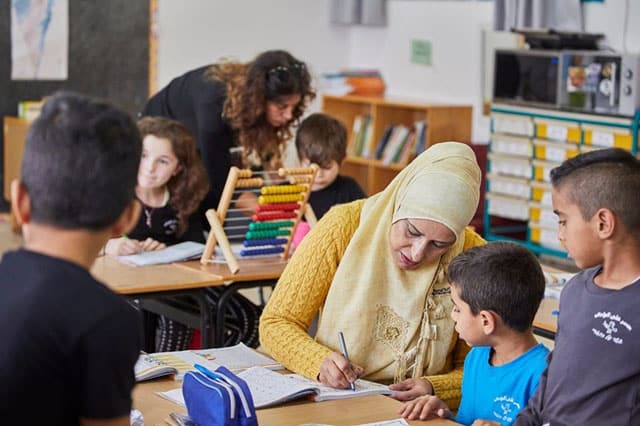 Courtesy of Hand in Hand
Courtesy of Hand in Hand Twenty-five years ago, an American Jew named Lee Gordon and a Palestinian citizen of Israel named Amin Khalaf came up with an idea. Though it seemed crazy, they thought it might work to foster peace and unity. What if Jews and Arabs in Israel attended school together?
With help from Jewish and Arab parents, Gordon and Khalaf established two preschools, one in Jerusalem and the other in the Galilee. They called their organization Hand in Hand and started with 50 students. Now, over two decades later, they have six schools and communities that serve over 2,000 students throughout Israel.
“We aim to teach our students to think critically, embrace difference, value equality and act as change agents in society.”- Leah Beinhaker
“We aim to teach our students to think critically, embrace difference, value equality and act as change agents in society,” said Hand in Hand’s Director of Resource Development Leah Beinhaker. “We have never strayed from our values and mission no matter which political coalitions have been in power.”
According to Beinhaker, more than 99% of Jewish and Arab children in Israel study in separate schools. There are very few exceptions.
“Due to these separate tracks, Jewish and Arab children do not have a structured opportunity to meet one another as children or young adults, so long as they are in the school system,” she said. “They also have little opportunity to learn about one another in a way that can dispel stereotypes, allay fears and overcome entrenched divisions in Israeli society.”
At Hand in Hand, Jewish and Arab students learn together starting from Pre-K until 12th grade. At the flagship school, the Max Rayne Hand in Hand Jerusalem School, which was founded in 1998, there are 664 students. Like at all of the schools, students study each other’s languages and learn about their cultures, religions and history.
Each of Hand in Hand’s six schools – which are located in Jerusalem, the Galilee, Wadi Ara, Haifa, Tel Aviv-Jaffa and Kfar Saba – is bolstered by a multicultural adult community and partnerships with the municipal and national governments. Along with schooling, the organization provides cultural and social programming. It promotes civic engagement and productive dialogue between Jews and Arabs.
“With each new student, school, community and public or institutional partner, Hand in Hand builds the foundations for a more equitable, shared society,” said Beinhaker.
Vicky Makhoul, an Arab Hand in Hand graduate who is now studying law at Tel Aviv University, said that going to school through the organization taught her to be open to hearing from others.
“We live in such a small space, with so much diversity around us, but we fear it because we don’t speak to each other, because we don’t know each other. But I grew up differently, in an environment that really allowed me to speak my voice, to speak my story, but also to be able to be open to others and hear their pain, their joy, their stories and their identity.”
Another Hand in Hand graduate, Jewish student Hagar Mizrahi, echoed a similar sentiment, saying she learned “to always be open to the people I meet and to not judge them before I get to know them.”
According to the principal of Hand in Hand’s Kfar Saba school, Mohammad Kundos, by bringing together Jews and Arabs who will grow up to lead the country in 30 years, they’re coming up with an outside of the box diplomatic solution.
“There are many streams in our society, and we should look into the underlying fear which leads to this need for societal segmentation,” he said. “Everyone fears losing their own identity, their own existence, their own story. But we offer an alternative, which does not blur the differences between us, but rather places an emphasis on each individual identity. In order to create complex dialogue among students, you must first be honest, and provide the narrative of the other in a clear and responsible manner.”






















 More news and opinions than at a Shabbat dinner, right in your inbox.
More news and opinions than at a Shabbat dinner, right in your inbox.